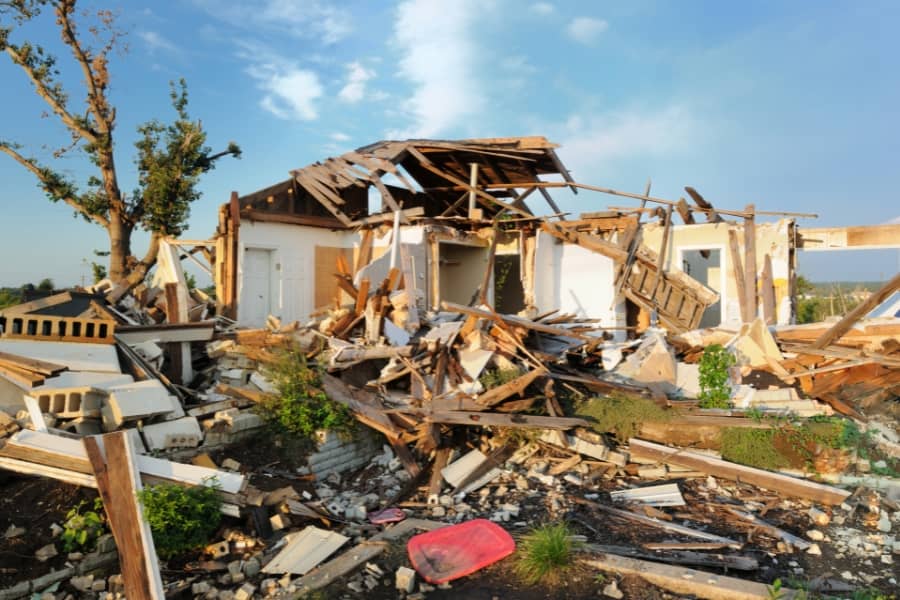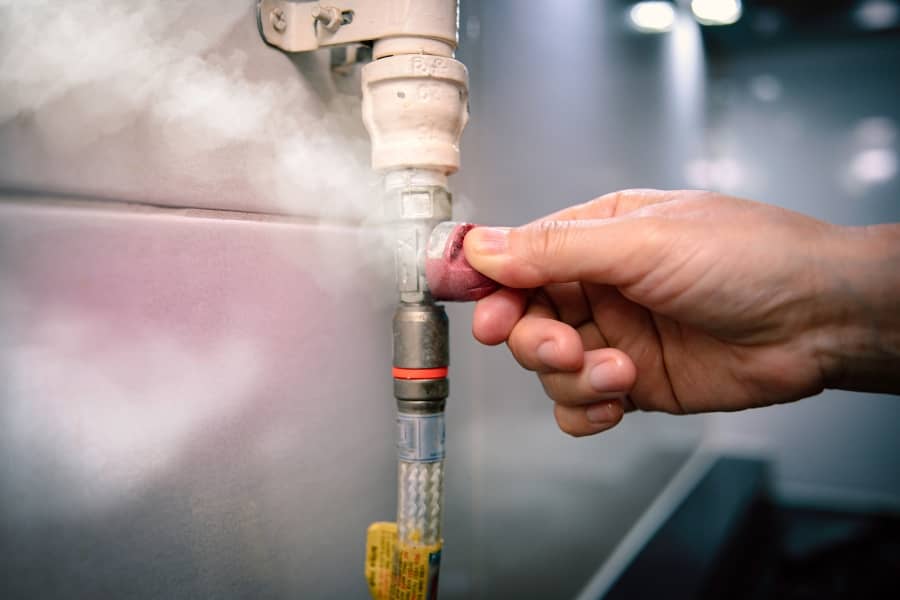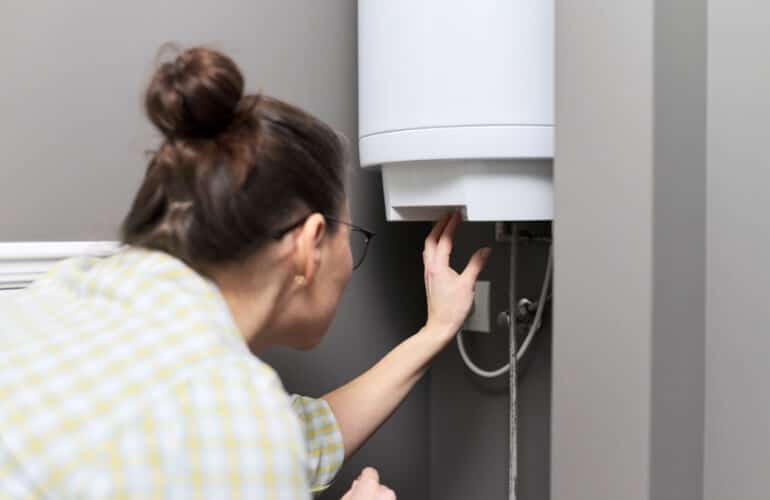
We don’t hear a lot about hot water heaters exploding, so more than likely, this dramatic type of appliance failure isn’t on your mind. However, even though these kinds of hot water heater explosions are unusual, they can cause a catastrophic amount of damage to your home if they do happen.
How Common Are Water Heater Explosions?
Thanks to modern safety features and regulations, water heater explosions are rare. In 2022, 108 incidents involving hot water heaters were reported to the United States Consumer Product Safety Commission. Of those, just two incidents were related to water heater explosions due to mechanical pressure.
What Causes a Water Heater Explosion?
There are two distinct ways that water heater tanks can cause an explosion. One concerns the tank itself; in particular, its pressure relief valve. The other is a risk only when a gas line powers the water heater.
How Water Heater Tanks Explode
To understand how a hot water tank can explode, it’s best to first understand how the tank works. A hot water tank is a big metal cylinder that stores and heats water. You can buy a hot water heater in either gas or electric powered models.
An electric heater uses a heating element metal coil that’s contained inside the tank. Alternatively, if it’s a gas-powered system, a natural gas line connects to a burner contained in a separate water-tight compartment at the bottom of the tank.
Water heaters have thermostats that regulate the water heater’s temperature of the water to keep it at a safe temperature, but although it is rare, these can fail.
Pressure relief valves, sometimes called a tp valve, are standard equipment on these types of water heaters. This is necessary because water expands as it’s heated. Inside the tank, pressure builds up as the water gets hotter. The hotter the water temperature, the more pressurized the tank becomes. Some excess pressure can be relieved via the water pipes that are connected to the tank.
When that mechanism fails to relieve excess pressure in the tank, the relief valve is triggered. It releases a small amount of steam and hot water to relieve the increasing pressure inside and let it fall back to a safe level.
What happens if the pressure-relief valve doesn’t do its job? If the tp valve fails for any reason, the pressure continues to build inside the tank. Eventually, the pressure will reach a critical level, and if the pressure inside the tank isn’t relieved, the tank will burst open violently.
Water heater explosions like this cause extensive, expensive water damage, but that’s not the biggest threat. If anyone is nearby when the tank explodes, they may be drenched in scalding hot water and severely injured by flying debris. Heaters have been known to become like missiles and blow through the roof of a home.
How a Gas Leak Can Cause a Water Heater Explosion

Another way in which this kind of explosion can occur is if you have gas line powering appliances in your home. If your home uses natural gas or propane to heat water, a gas leak can potentially facilitate a water heater explosion. This can happen if the gas leaks in the vicinity of the hot water tank, because the tank’s gas burner has a small ignition flame.
If the gas leak causes gas to build up around the flame, the gas may ignite and cause an explosion. This is a terrible situation, as not only will the tank explode, but the gas line itself may rupture, causing a fire.
Using gas anywhere in the home does have an element of risk, because it is flammable and combustible. Fortunately, gas-powered systems are very safe, if properly installed and maintained by a professional plumber. However, it’s always important to be aware of the risks of using gas, and to know what to do when you suspect a gas leak.
If there’s a natural gas leak in your home, one of the most noticeable signs is the smell of rotten egg. If you have a gas line in your home, and you smell rotten egg for no apparent reason, there’s a definite chance that it could be a gas leak. Natural gas has no odor, so a chemical called mercaptan is mixed with it to indicate a leak.
If you suspect a gas leak in your home, it’s always safest to immediately evacuate and call emergency services or your utility company for help.
Can Tankless Water Heaters Explode?
If you have a tankless water heater, you can breathe a sigh of relief. Since these water heaters don’t store water, there’s no risk that a pressurized water tank can explode.
However, if your tankless water heater uses gas to heat the water, the gas leak risk is still a factor. All of the same precautions around the use of gas apply if you have a gas-powered tankless water heater.
Hot Water Heater Explosion Warning Signs

Some water heater explosions happen so quickly that there’s no time to notice there’s something wrong. But in some cases, there are warning signs that indicate there’s a risk a water heater may explode. If you notice any of these signs, call a professional plumber ASAP. You may be able to avoid a potentially dangerous water heater explosion altogether.
- Leaking pressure relief valve. If the pressure valve does not reset properly after it was released, it is a sign that the pressure valve isn’t functioning correctly. If you find water pooling near the water heater, call a professional plumber immediately.
- The hot water tank is making popping noises. If you hear strange noises coming from the tank, particularly a knocking or popping noise, it can mean there’s a lot of sediment in the tank.
Sediment buildup interferes with water heating and can make the temperature inside the tank higher—which in turn increases the pressure in the tank. The popping noises you hear are the sound of bubbles of water in the tank pushing through the sediment layer.
- The tank is visibly shaking. If your hot water tank is shaking, shut it down immediately and call a professional.
- Brown water flows out of the tap. Dirty looking water or brown water are indications that there’s lots of sediment in the hot water tank and a new anode rod or a new tank may be necessary.
How to Avoid a Water Heater Explosion

Water heater explosions are rare, but not so rare that it’s safe to ignore water heater maintenance! To keep your hot water tank in the best operating condition, it’s important to keep up with regular maintenance and repairs from your local plumbing company.
Lower your hot water temperature. The higher your water heater’s temperature is, the more pressure builds up inside the tank. Maintain the water temperature to between 120 degrees and 125 degrees Fahrenheit, to achieve a good balance between hot water and reduced risk of an injury from scalding hot water.
This temperature is also safer if you have children in the home, as it’s not hot enough to cause scalding burns. It doesn’t require boiling water to burn the skin—temperatures as low as 140 degrees can burn the skin badly enough to require surgery, after just three seconds of exposure.
Invest in professional regular maintenance. Have a professional plumber complete an annual water heater tune-up. This ensures all parts of the tank are in good condition, and that the tank’s safety mechanisms are working as they’re supposed to. A plumber can also ensure that water lines to and from the tank are in good shape and no leaks are detected. When you need repairs, or you need a new tank installed, leave it to a professional plumber.
For Professional Help with Your Hot Water Tank
Water heater explosions are rare, but not so rare that it’s safe to ignore water heater maintenance! To keep your hot water tank in the best operating condition, it’s important to keep up with regular maintenance and repairs as needed.
When you’re in need of water heater repair and maintenance, call CW Service Pros for fast, friendly, and expert service.
















